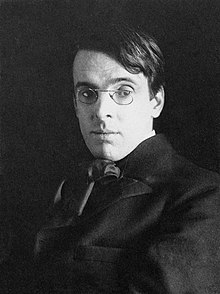William Butler Yeats
William Butler Yeats (13. juuni 1865 Dublini lähistel – 28. jaanuar 1939 Prantsusmaa, Roquebrune-Cap-Martin) oli iiri kirjanik ja avaliku elu tegelane, keldi taassünni keskne autor, mõjukamaid 20. sajandi lüürikuid, Nobeli kirjandusauhinna laureaat 1923.


Sest pattude patt on kõik maotu, kõik inetu,
tuhmund ja loid.
Tahaks istuda kingul ja luua kõik uueks - oo
loomingu võit,
Kui veest ja taevast ja maast saaks kuldlaegas, kus
hoiaksin noid
Oma ulmi - su pildi mu südames roosina punavat õit!
- "Armastaja jutustab roosist oma südames" (1899). Tõlkinud Ants Oras
[...]
The wrong of unshapely things is a wrong too great to be told;
I hunger to build them anew and sit on a green knoll apart,
With the earth and the sky and the water, re-made, like a casket of gold
For my dreams of your image that blossoms a rose in the deeps of my heart.
Kuid kõik, mis mul vaesel on, on mu ulmad;
Olen laotanud ulmad su jalgade ette;
Käi tasa, sest see, millel käid, on mu ulmad.
- "Ta igatseb endale taevakangaid" (1899). Tõlkinud Märt Väljataga
[...]
I would spread the cloths under your feet:
But I, being poor, have only my dreams;
I have spread my dreams under your feet;
Tread softly because you tread on my dreams.
Ma ütlesin: "Olen veel noor."
Ja siis: "Olen vana ma juba."
Ja heitsin penni, et saada
Armastamiseks luba.
"Mine armasta, armasta, poiss,
Kui noor ja ilus on naine."
Ah, mu penn, pruun penn, pruun penn,
Mind matab ta juuste laine.
- "Pruun penn" (1910). Tõlkinud Märt Väljataga
I whispered, ‘I am too young,’
And then, ‘I am old enough’;
Wherefore I threw a penny
To find out if I might love.
‘Go and love, go and love, young man,
If the lady be young and fair.’
Ah, penny, brown penny, brown penny,
I am looped in the loops of her hair.
[...]
- Brown Penny, 1910
Kõik läbi kaalutles mu meel:
Näen tühjust vaid, kui taha kaen
Ja tühjus vaid on paistmas eel,
Kui seda elu, surma vaen.
- "Iiri sõjalendur aimab ette oma surma" (1919). Tõlkinud Märt Väljataga
[...]
I balanced all, brought all to mind,
The years to come seemed waste of breath,
A waste of breath the years behind
In balance with this life, this death.
Vaob jälle pimedus, kuid nüüd ma tean:
Kaks tuhat aastat kivist und on tüüdand
Luupainaja, kes magab sõime kõrval;
Mis jõhker elajas, kel tund on saabund,
Nüüd loivab Petlemmasse sündima?
- "Teine tulemine" (1921). Tõlkinud Märt Väljataga
[...]
The darkness drops again; but now I know
That twenty centuries of stony sleep
Were vexed to nightmare by a rocking cradle,
And what rough beast, its hour come round at last,
Slouches towards Bethlehem to be born?
- The Second Coming, 1921
Mõõgatupel kuldne tikand,
Ilu ja loll on ühte hakand.
- "Sümbolid" (1933). Tõlkinud Märt Väljataga
Kui naine armastab, siis see
Ta uhkust veel ei riku;
Kuid oma koja Armastus
On rajand tagumikku,
Sest ilma prao ja lõheta
Ei ole terviklikku.
- "Hull Jane ajab juttu piiskopiga" (1933). Tõlkinud Märt Väljataga
[...]
‘A woman can be proud and stiff
When on love intent;
But Love has pitched his mansion in
The place of excrement;
For nothing can be sole or whole
That has not been rent.’